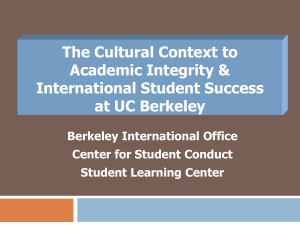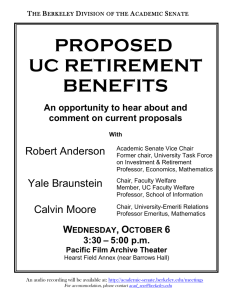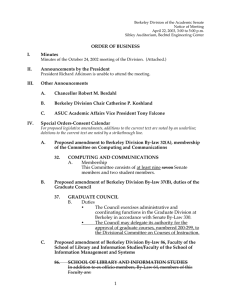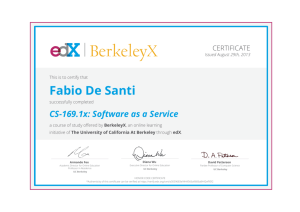APPROVED MINUTES OF MEETING BERKELEY DIVISION OF THE ACADEMIC SENATE April 22, 2003
advertisement
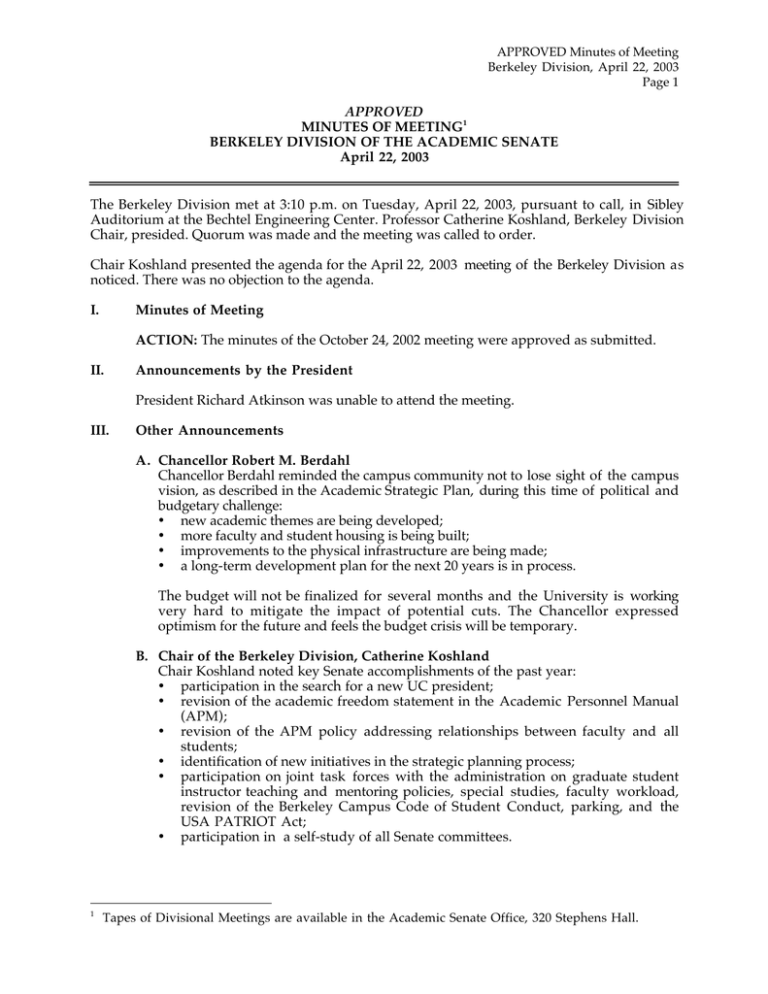
APPROVED Minutes of Meeting Berkeley Division, April 22, 2003 Page 1 APPROVED MINUTES OF MEETING1 BERKELEY DIVISION OF THE ACADEMIC SENATE April 22, 2003 The Berkeley Division met at 3:10 p.m. on Tuesday, April 22, 2003, pursuant to call, in Sibley Auditorium at the Bechtel Engineering Center. Professor Catherine Koshland, Berkeley Division Chair, presided. Quorum was made and the meeting was called to order. Chair Koshland presented the agenda for the April 22, 2003 meeting of the Berkeley Division as noticed. There was no objection to the agenda. I. Minutes of Meeting ACTION: The minutes of the October 24, 2002 meeting were approved as submitted. II. Announcements by the President President Richard Atkinson was unable to attend the meeting. III. Other Announcements A. Chancellor Robert M. Berdahl Chancellor Berdahl reminded the campus community not to lose sight of the campus vision, as described in the Academic Strategic Plan, during this time of political and budgetary challenge: • new academic themes are being developed; • more faculty and student housing is being built; • improvements to the physical infrastructure are being made; • a long-term development plan for the next 20 years is in process. The budget will not be finalized for several months and the University is working very hard to mitigate the impact of potential cuts. The Chancellor expressed optimism for the future and feels the budget crisis will be temporary. B. Chair of the Berkeley Division, Catherine Koshland Chair Koshland noted key Senate accomplishments of the past year: • participation in the search for a new UC president; • revision of the academic freedom statement in the Academic Personnel Manual (APM); • revision of the APM policy addressing relationships between faculty and all students; • identification of new initiatives in the strategic planning process; • participation on joint task forces with the administration on graduate student instructor teaching and mentoring policies, special studies, faculty workload, revision of the Berkeley Campus Code of Student Conduct, parking, and the USA PATRIOT Act; • participation in a self-study of all Senate committees. 1 Tapes of Divisional Meetings are available in the Academic Senate Office, 320 Stephens Hall. APPROVED Minutes of Meeting Berkeley Division, April 22, 2003 Page 2 Issues of concern in the coming year will include: • maintenance of the progress made in admissions policies over the past five years; • maintenance of the highest quality of academic programs and services during the budget crisis, through the Chancellor's Executive Budget Steering Committee and its subcommittees; • completion of the new program review processes currently being piloted in selected departments; • continuing the discussions of academic freedom and civil liberties initiated by the Senate. Chair Koshland expressed appreciation for the support and counsel of colleagues during the past two years, and acknowledged the contributions of Senate Executive Director Maureen Morley and her staff. C. ASUC Academic Affairs Vice President Tony Falcone ASUC Vice President Tony Falcone's report to the Division was read by ASUC President Jesse Gabriel, who appeared on his behalf. Vice President Falcone was on the East Coast and unable to attend the meeting. Vice President Falcone's experience at Berkeley contrasts with the enthusiasm students at East Coast private schools have for their universities, the students' extensive engagement with faculty and administrators, and the more concentrated efforts by these schools toward excellence and improving student life. Nevertheless, the ASUC recognizes recent efforts at Berkeley to increase faculty contact with students, expand access to courses and majors, and develop new research initiatives. Vice President Falcone sees three critical areas for Senate and student leadership to help bridge this gap: • Student life and basic student services must be protected from budget cuts. Programs that benefit or impact more students should be prioritized to protect basic services. • Research and educational opportunities for students need to be developed and improved. Large class sizes need to be addressed, with an eye to improving student experiences in the classroom. The ASUC is interested in contributing funds to campus improvements and programs. • Students would like a greater part in campus governance on pertinent issues. Student involvement leads to better decisions, and would enhance connectedness and the desire to support the University. IV. Special Orders-Consent Calendar For proposed legislative amendments, additions to the current text are noted by an underline; deletions to the current text are noted by a strikethrough line. A. Proposed amendment to Berkeley Division By-law 32(A), membership of the Committee on Computing and Communications 32. COMPUTING AND COMMUNICATIONS A. Membership This Committee consists of at least nine seven Senate members and two student members. APPROVED Minutes of Meeting Berkeley Division, April 22, 2003 Page 3 B. Proposed amendment of Berkeley Division By-law 37(B), duties of the Graduate Council 37. C. GRADUATE COUNCIL B. Duties The Council exercises administrative and coordinating functions in the Graduate Division at Berkeley in accordance with Senate By-Law 330. The Council may delegate its authority for the approval of graduate courses, numbered 200-299, to the Divisional Committee on Courses of Instruction. Proposed amendment of Berkeley Division By-law 86, Faculty of the School of Library and Information Studies/Faculty of the School of Information Management and Systems 86. SCHOOL OF LIBRARY AND INFORMATION STUDIES In addition to ex officio members, By-Law 64, members of this Faculty are: 1. All members of the Berkeley Division of the Academic Senate who give instruction in the School of Library and Information Studies. 2. Not more than three representatives of other departments on the Berkeley Campus, serving for one year, upon nomination by the Executive Committee of the School and approval by the Faculty. 3. As non-voting members, all other persons giving instruction in the School of Library and Information Studies, during each term in which they are teaching. 86. SCHOOL OF INFORMATION MANAGEMENT AND SYSTEMS In addition to ex officio members, By-Law 64, members of this Faculty are all members of the Division who are members of the School of Information Management and Systems. ACTION: The consent calendar was approved without objection. V. Reports of Special Committees (None) VI. Reports of Standing Committees A. Committee on Faculty Research Lectures Professor Randy Schekman, chair of the Committee on Faculty Research Lectures, introduced two department chairs to present the Faculty Research Lecturers for 2003-04. Professor David Wake (Integrative Biology) Professor Roy Caldwell, chair of the Department of Integrative Biology, presented honoree, Professor David Wake, curator of herpetology. Professor Wake joined Berkeley's Department of Zoology in 1969. He has served as director of the Museum of Vertebrate Zoology. He was a member of the "Gang of Four" in the early 1980s, which restructured the biology department into its current configuration, and joined the Department of Integrative Biology in 1989. Professor Wake has been highly influential in the field of evolutionary biology through his research, leadership in professional societies, and through the number of scientists he has trained in that field. He has taught the classic course in APPROVED Minutes of Meeting Berkeley Division, April 22, 2003 Page 4 evolutionary biology at Berkeley for 30 years. His career has reflected changes in the field of evolutionary biology over the past 40 years. Professor Wake's current research focuses on declining numbers of reptiles and amphibians, which may be indicative of a global shift. Professor Erich Gruen (History/Classics) Professor Jon Gjerde, chair of the Department of History, presented Professor Erich Gruen. The comments of Professor Robert Knapp, chair of the Department of Classics, were read, as Professor Knapp could not be present. Chair Knapp emphasized Professor Gruen's exceptional knowledge and mastery of a wide range of major historical areas. He exhibits the finest qualities of a teacher, colleague, and scholar. Chair Gjerde also noted Professor Gruen's unusually broad range of knowledge and his keen, critical historical analysis. Professor Gruen is adept at transmitting his thoughts and knowledge through accessible writings, extraordinary teaching skills and an active lecture schedule; he is a past recipient of the Distinguished Teaching Award. B. Committee on Admissions, Enrollment, and Preparatory Education Professor Calvin Moore, chair of the Committee on Admissions, Enrollment, and Preparatory Education, presented the annual report on undergraduate admissions. Chair Koshland commended Chair Moore for his work on the committee over the past five years. Chair Moore's presentation follows: "Good Afternoon. I am very pleased to present this annual report on undergraduate admissions on behalf of the AEPE Committee. This is my fifth and final annual report since David Stern will be taking over as Chair of the Committee next year. We have just completed the fall 2003/spring 2004 freshman admissions cycle and sent out nearly 37,000 decision letters on March 27. Approximately 10,000 applications for advanced standing admission have been received and are being processed. These decisions will be available May 1. Berkeley is in its sixth year of comprehensive review for freshman applications. Beginning in 1998, every freshman application file (now nearly 37,000) is read, analyzed, and then given a score by two trained professional readers. The second reader is not aware of the score given by the first reader. Each reader scores a file on a seven-point scale. If the scores given by the two readers are adjacent, the two scores are averaged to get a final score, while files receiving discrepant scores are referred to an experienced third reader for resolution. Only about two to three percent of files require a third read, a number that is reassuringly low. In addition, several thousand files lying near the admit-deny decision line or which are unusually complex receive an additional one, two, or even sometimes three reads after the initial reading process is completed. In their evaluation, the readers follow criteria, guidelines, and scoring rubrics determined by our Senate Committee. The scoring is based on an evaluation of the entire file, bringing to bear many different criteria and where no one criterion or set of criteria has a fixed and predetermined weight. All achievements of the applicant are evaluated in terms of the context from which the student comes, both academic (e.g. the nature of the high school) and socio-economic (the home and APPROVED Minutes of Meeting Berkeley Division, April 22, 2003 Page 5 community environment). Readers are asked to pay especial attention to the extent to which the applicant took advantage of the opportunities that were available in the school, and to what extent the applicant challenged him or herself. Readers are also asked to place particular emphasis on how well the student performed in comparison to other applicants from the same school. Readers are provided with summary statistics with each file indicating how the applicant ranks, on a variety of academic indicators, relative to all applicants to Berkeley, and also relative to applicants to Berkeley and to UC from his or her high school. Readers are also provided with each file a statistical profile of the academic and demographic characteristics of the high school that the applicant attends. Altogether we employed about 90 readers this year. Nearly 40 were professional career staff in the admissions office, while the others were hired on a temporary basis for the reading process. These temporary readers include retired UC admissions professionals, retired UC student service officers, high school college counselors, independent college counselors, retired high school teachers, retired high school principals, outreach counselors, and even a retired admissions director from another university. This year for the first time the group included emeritus faculty members -- three this year. These temporary positions are advertised and we received 150 applicants. Two-thirds of those hired have read for us in the previous year, and some have done so for 10 years. From my own extensive interactions with these readers, I find them to be an extremely talented, experienced, and dedicated group of individuals. Every reader, even those with many years of experience, is required to go through 40 hours of reader training before they read and score a single real file. In addition, about 20 hours of further in-service training is required during the reading process. Although the third read rate is reassuringly low, we undertook this year two additional assessments of the reliability of the reading process. In one project, we asked that a small number of files (80) be read by 21 readers each so that we could compute reliability coefficients. The statistical details are too complex to go into here, but the end result was quite gratifying with computed reliabilities of the scoring process of about .90. In another project to assess the reliability of the reading process, we asked the Admissions Office to select a stratified random sample of 66 files from the 2002 cycle. Then three members of the committee read and scored these files. I read and scored all 66, while Fiona Doyle and David Stern read 33 each so each file received a double read. We then met and compared our scores with each other (happily we had no third reads) and then compared our scoring with the actual scores. We agreed exactly with the actual readers in 47 of the 66 cases; we differed by a half point in 17 cases (in 9 we gave lower scores than the actual readers and in 8 we gave higher scores). In two cases we were off by a full point (one higher, one lower). In no case would our read scores have changed an admissions decision, although in four cases, we would have switched between a fall admit and spring admit decision. The results of this exercise were also quite gratifying. But both of these exercises underlined for us the crucial importance for the reliability of the reading process and the credibility of the decisions based on it, of having all files read and scored independently by at least two readers. Indeed, one APPROVED Minutes of Meeting Berkeley Division, April 22, 2003 Page 6 of the hallmarks of the Berkeley admissions process is that all files be read independently by two or more readers. I would now like to turn to the outcomes of this year’s admission cycle. Out of 36,920 freshman applicants, 8,679 were admitted for fall for an admit rate of 23.5%. An additional 2,085 were admitted for spring. The mean high school GPA and mean test scores of the admitted class are up very slightly from last year, as are the number of A-G courses taken and the number of Honors and AP courses taken. Among the admitted class there were 1,379 underrepresented minorities, constituting 16.3% of the class. The total number is up modestly from 1,352 last year, when the percentage was also 16.3%. Let me conclude by saying that Pam Burnett, Director of Admissions and her staff do an absolutely wonderful job in running a very complex and delicate process. Their professionalism and dedication are exceptional. We are in fact running an admissions system very much like that run by selective private universities, but on a public university budget, rather than a private university budget. Also I should note that Harvard for instance receives a mere 20,000 applications compared to our 47,000. It has been my pleasure to work closely with Pam over my six years on AEPE with five of those as Chair. Pam and her entire staff deserve our profound gratitude. Pam, could you please stand so we can recognize you and thank you for your outstanding work. I would be pleased to respond to your questions." Questions from the audience raised the following points: • The current case before the Supreme Court regarding University of Michigan's race-conscious admissions policies is not pertinent to Berkeley, which is regulated by Proposition 209. • Under-represented minorities comprise about 40% of high school graduates. Of these, about 20-22% are UC-eligible. Under-represented minority applicants are admitted in the Fall to Berkeley at a rate of 88% compared to all applicants. • Reader scores have been found to correlate with college success. Outreach work continues, despite threats to budgets. C. Committee on Rules and Elections Professor Roberta Park, chair of the Committee on Rules and Elections, reported that 440 ballots were received in the 2003 election. The following Senate members were elected: Divisional Council: Ian Carmichael (Earth & Planetary Science) David Hollinger (History) Katharine Milton (ESPM) Committee on Committees: Gibor Basri (Astronomy) Mary Firestone (ESPM) Stuart Linn (MCB) Lorraine Midanik (Social Welfare) Committee on Committees of Letters & Sciences: Michael Manga (Earth & Planetary Science) Bonnie Wade (Music) APPROVED Minutes of Meeting Berkeley Division, April 22, 2003 Page 7 VII. Petitions of Students (None) VIII. Unfinished Business (None) IX. University and Faculty Welfare A. Chair Koshland presented a panel of faculty to discuss the implications of post9/11 security, the changing national climate, and recent legislation for the campus community. This continues the discussion of civil liberties and academic freedom begun at the fall meeting. The panelists presented briefly on specific topics and responded to questions: Dean Michael Nacht, Goldman School of Public Policy -- National Security Dean Nacht noted that Berkeley's position should be well thought out and strive to preserve academic freedom, as it will be scrutinized by other universities. Issues for consideration include: • the management and siting of classified research, if conducted at the University; • federal funding could be allocated selectively out of concern for national security; • the publication of some research and the education of international scientists could be seen as having implications for national security. Dean Tom Campbell, Haas School of Business -- USA PATRIOT Act and Related Legislation This legislation has two primary policy concerns for the University: • The broad scope ("related to an investigation") of anti-terror and national security-related cases gives government much wider grounds for the subpoena of documents. Neither probable cause nor notification of the individual is required, unlike in normal criminal law. This may be in conflict with the Fourth Amendment. • Policies governing the maintenance of library and e-mail (Internet service provider-ISP) records should be reviewed as regard this new legislation. There are important implications for privacy considerations. Dean Campbell urged that the campus develop, in advance, plans for responding to a subpoena for library records, e-mail addresses (of outgoing and incoming messages), or e-mail content of those for which Berkeley is an ISP. Without advance planning, administrators would be pressured to respond quickly. The USA PATRIOT Act and its amendments should be scrutinized for potential violations of civil liberties. Robert Price, Associate Vice Chancellor for Research -- Research Impacts • The Public Health Security & Bioterrorism Preparedness & Response Act of 2002 and the USA PATRIOT Act define a level of select bioagents used in laboratories, above which those laboratories and personnel with access would be required to register. Certain categories of people are also excluded from working in these laboratories. At this time, Berkeley is not affected by the select agent threshold, but a decrease in the threshold or a change in research conditions could make the University subject to this requirement. • There is a potential for restrictions in the publication of research. APPROVED Minutes of Meeting Berkeley Division, April 22, 2003 Page 8 Associate Professor Steven Weber, Department of Political Science -- Global Context Professor Weber observed that a new U.S. strategy since September 2002 is based on the use of pre-emptive force in anticipation of emerging threats. The domestic impacts (including to the university) include: • a more visible domestic military presence; • a blurring of the line between law enforcement and military strategy, so that personal information is more accessible to the government for national security and defense. An open question period ensued, including the following points: • It was questioned whether the University might influence a change in the USA PATRIOT Act with respect to the restrictions on international scholars, which threaten the University's mission. The USA PATRIOT Act Steering Committee is addressing such issues. The Association of American Universities also has a liaison in the Department of Homeland Security to work on university concerns. Dean Campbell stated that limiting the University's liability through the way records are managed would be more realistic. Although the sunset clauses may be disputed, the act itself is not likely to be repealed. • The research function of universities provides some protection from government regulation. • The broad criteria allowed for subpoena of records under the new rules could be challenged in court by a single university, but that could jeopardize its federal research funding. Challenge by a group of universities might be less risky, but still a serious undertaking. • In response to a protest about the apparent omission of scientists on this meeting's panel, Chair Koshland replied that three scientists had been invited to the panel but were not able to attend. She added that Associate Vice Chancellor Price was able to speak to scientific research concerns. • The status of registered aliens and other non-permanent citizens under the USA PATRIOT Act was questioned. There is at present no provision for revocation of citizenship, but this could change in the future. • A faculty member called for the University to uphold the civil liberties of the faculty as a matter of principle. X. New Business (None) The meeting was adjourned at 5:10 p.m. Roberta J. Park Secretary, Berkeley Division
